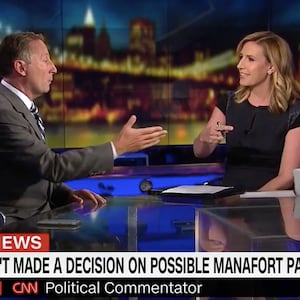Business Insider wants its reporters to deliver scoops that dig up juicy, interesting dirt on major companies. But when it comes to its own employees, it is making sure they keep their mouths shut. Forever.
Earlier this month, Insider Inc., the company that includes Business Insider and general interest news site Insider, asked all of its employees to sign a new confidentiality and proprietary developments agreement.
Several employees told the Daily Beast that they noticed the new agreement included a non-disparagement clause requiring employees to refrain from ever criticizing the company during or after their employment at Insider.
ADVERTISEMENT
“I agree that, during my employment by the Company and at all times thereafter (regardless of the reason for termination), I will not make, or cause to be made, any disparaging or defamatory statements (whether oral or written) concerning the Company, or any of its former, present or future officers, managers, directors, members, stockholders, or employees, including any statements that that could injure, impair or damage the relationships between the Company and any of its officers, managers, employees, customers, clients, suppliers or vendors,” the contract said, according to a copy reviewed by The Daily Beast.
Several Insider employees, who spoke with The Daily Beast on the condition of anonymity because they were bound by these contracts, said that some staffers had previously signed agreements that included a non-disparagement clause, while others said they did not recall signing such paperwork. The company has had non-disclosure clauses in employee contracts for at least the last three years.
According to two sources, as of last week, several employees still had not signed the agreements, which were due to human resources earlier this month.
In a statement to The Daily Beast, a spokesperson for the company said that the agreements were industry standard, and that even if employees had not previously noticed the clause, the non-disclosure language had been included in contracts at the company in the past.
"Our non-disparagement agreement has been in place for many years,” a spokesperson said. “To our knowledge, it is also standard within our industry."
Critics point out that while non-disparagement agreements have become widespread in many industries, they’re often used by employers to keep accusations of misbehavior under wraps.
According to The New York Times, federal agencies that aim to protect workers’ rights have studied whether non-disparagement contracts have a chilling effect on workers speaking out in the workplace.
Some media companies shy away from asking all employees to sign non-disparagement agreements because they believe it clashes with the mission to shine light on misbehavior. Others, including Mic, Vice, and HuffPost, have asked departing employees who have been laid off to sign them in exchange for severance pay.
Media lawyers and ethics experts argue that media companies should be held to a higher standard of transparency because they themselves expect transparency from the politicians, businesses, and public figures they cover.
“I do not think organizations that claim to be in the news business should gag their employees,” said Jane Kirtley, a specialist in media ethics and law at the University of Minnesota. “After all, journalists are sometimes stymied in their reporting because a source is subject to an NDA.”
Stuart Karle, the former COO of Reuters and top lawyer at Dow Jones (and a former lawyer for The Daily Beast), called the terms “small ‘H’ hypocritical.” He noted that while non-disparagement clauses are typical in separation agreements at many media companies for employees who have been laid off or brought forward complaints, the agreements make for poor optics.
“Legally, pretty typical,” he said, “but kind of dumb.”
The new contract also asked employees to agree to mandatory arbitration with the company. While arbitration can often be a quick, cheap, and efficient means for employees and employers to settle claims, critics have argued that forced arbitration can often be a friendlier venue for employers than complainants.
Arbitrators often work with employers regularly, and have business interests in ruling in their favor. Arbitration also keeps proceedings private. (The practice has become increasingly common: Over half of US workplaces have mandatory arbitration agreements).
It’s unclear what exactly prompted the changes, though Business Insider was recently at the center of a mini-firestorm after it deleted a widely criticized column, prompting the author—the site’s conservative blogger—to resign.
While the company appears to be seeking to crack down on negative internal news, it has cause for optimism. Insider Inc. has repeatedly signaled to its employees that it is in fairly strong financial shape.
In a memo earlier this year, global editor-in-chief Nicholas Carlson said the company was hiring dozens of new editorial employees in an effort to beef up the newsroom, a hiring spree that contrasts with cuts and layoffs at many other digital news organizations.
Insider moved to a newer, more spacious office earlier this year, and has repeatedly rewarded employees because of the company’s profitability, giving the staff free snacks to celebrate. And during a recent newsroom meeting, the company even presented its top two highest-ranking editorial employees, Carlson and U.S. editor-in-chief Alyson Shontell, with oversized bonus checks to mark their ten-year anniversaries at the company.
Disclosure: This author worked at Business Insider from April 2015 until Jan. 2018.








